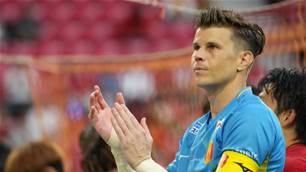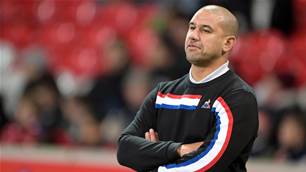There are few more idyllic locations in world football than Central Coast Stadium.
In a salary-capped league, Central Coast have finished in the bottom-three for each of the past five seasons, failing to register a blip on the competition since the departure of now-Socceroos boss Graham Arnold.
Their decline began under previous owner Peter Turnbull, when it was revealed in early 2013 that players were on the brink of walking away due to unpaid wages. The famously unified Mariners dressing room had fractured and the club – which were still second in the league – were teetering on the verge of collapse.
The saviour was long-term shareholder Mike Charlesworth, an English businessman and Leeds United fanatic, who had already witnessed the devastating effect of a club’s decline into financial ruin. After paying Turnbull’s debts, an empathetic Charlesworth launched a widespread campaign, seeking long-term investment from the famously tight-belted local government, cash-strapped FFA and unnamed foreign investors.
“I don't think it's right that an individual from England should be carrying the financial can for football on the (Central) coast,” Charlesworth told the Mariners’ website in 2015.
“There are a number of people we'll be asking to come forward, but we're very confident of a successful future for the Mariners, put it that way.
“We've got a great tradition now, a great heart, a great culture, and that will continue. We're not any less ambitious that anyone else, perhaps we're more ambitious. Success breeds success. That will continue.”
Despite Charlesworth’s rally-cries, warning signals began to sound when financial stability, with the view of onselling the club, couldn’t result in outside investment. Ultimately it was two months from December 2013 to January 2014 that broke the Mariners: 62 days that became the darkest in an ever-darkening history for the club.

The downturn began when club icon Patrick Zwaanswijk retired, before Arnold and renowned sports scientist Andrew Clark took posts at Japanese club Vegalta Sendai. Star import Marco Flores then ruptured his anterior cruciate ligament, while then-reigning Team of the Season entrant Michael McGlinchey, future Socceroo Trent Sainsbury and record-goalscorer Daniel McBreen continued a mass exodus.
In return, the Mariners recruited unusually poorly; bringing in Eddy Bosnar, Glen Trifiro, Matt Sim, Isaaka Cernak and short-lived K-League winger Kim Seung-Yong. This ushered in a series of short-lived foreign signings and Fortress Gosford, which had stood test to Asia’s biggest clubs throughout the Mariners’ hey-day, subsequently fell. Five years later and the club is still trying to claw it back.
Now a passionate Mariners fan, whose social media abounds with photos of his son in yellow and navy, Mielekamp missed the golden years. Upon taking the role of CEO in 2015, the Mariners had slipped from third position to eighth and were in the midst of a 10-player cleanout.
His tenure has overseen an eighth-placed finish and three wooden spoons, in one of the starkest turnarounds in Australian sport. From the A-League’s inception until the 2013 Grand Final, the Mariners were the best side in the competition, playing 195 games, winning 85 and scoring 310 points. From 2013 until February this year, the Mariners played 156 matches and won only 31, earning 128 points. Their rivals, Newcastle, are the next worst: 53 points better off.
It’s a shocking decline nobody at Central Coast expected, but it’s a familiar story for Mielekamp. During his time at South Sydney Rabbitohs the club only finished as high as seventh, while in four years at Penrith Panthers they only finished above 11th once.
Mielekamp’s luck finally appeared to change when he jumped ship to the A-League as commercial manager of Western Sydney Wanderers. But after two successful years in the role, the Wanderers slumped to ninth place and Mielekamp again departed to take up his fifth role in eight years at the helm of the Mariners.
Now, with extensive experience trying to sell a distant ideal to frustrated fans of an underperforming team, he insists that listening is the most important part.
“The community, because we’re close and engaged, you hear it all – the good, the bad, the indifferent,” he says. “It’s been really rewarding to hear how many people are passionately still with us – they’re supportive of the journey we’re going on and those things really buoy you.
“But they’re not afraid to tell you when they’re not happy as well and we’ve got to take that on board and listen, if nothing else. Make sure we take the time to listen and understand.
“Anyone who engages the Mariners brand needs to understand how they can help us grow – every time we go to a school we need to turn them into fans, they need ticket offers and to know where the stadium is, it’s about doing the right thing. You’ve got to believe if you do the right thing, the right thing will happen to you as well.
“We’re doing as much as our resources and manpower allow. Is it enough? It’s never enough. There’s never enough good stuff that we can do out there, we’ve got to keep doing more. I think we reached well over 10,000 kids in schools last season.
“But it’s not enough, it’s a bottomless pit…”
Related Articles
.jpeg&h=172&w=306&c=1&s=1)
Socceroos prodigy returns to A-League after horror run

Star keeper's exit heralds hero's return at A-League giant













